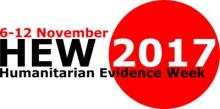

From 6-12 November, Evidence Aid is organising the Humanitarian Evidence Week 2017 (HEW2017) – one week of blogs, webinars, training, debates, and other initiatives to promote a more evidence-based approach to humanitarian aid. For the HEW2017, Evidence Aid has brought together more than 20 organisations to create a platform highlighting their work related to the generation, use, and dissemination of evidence in the humanitarian sector. I, as Director of Evidence Aid, feel the HEW2017 provides that much needed space for organisations to promote initiatives and publications that otherwise would be relegated to shelves to collect dust and be forgotten.
Evidence Aid has highlighted more than once the need for a more evidence-based approach in the humanitarian sector and the many related evidence gaps. I feel that although there is clear need for additional evidence, there is also evidence and related initiatives out there that do not get the attention they deserve. Therefore, Evidence Aid developed this initiative, together with our partner the Centre for Evidence-Based Medicine (CEBM). For us it is important that it furthers our joined interest in promoting an evidence-based approach - something we have in common with Cochrane.
During HEW2017, Evidence Aid will be offering training and are also involved in several of the other events that you can read about on the HEW2017 webpage. I personally look forward to editorial on the IRIN news website by Save the Children on 6th November that will kick off the HEW2017.

As part of HEW2017 there will be three exciting events in London. I look forward chairing the first one on Monday 6 November at the London School of Hygiene and Tropical Medicine (LSHTM) with Bayard Roberts (Professor of Health Systems and Policy at LSHTM) talking about the opportunities for the RECAP project to improve evidence-based decision-making and accountability in humanitarian response, with responses from Gareth Owen (Emergency Director at Save the Children UK) and Alice Obrecht (Research Fellow at the Secretariat for the Active Learning Network for Accountability and Performance, ALNAP). The next day (Tuesday 7 November) our founder, Professor Mike Clarke, will run a 1-day Evidence Aid course placing systematic reviews in the context of disasters and the provision of humanitarian aid. Finally, on 9 November, I hope you will join me at the University College London Thomas Coram Research Unit Library at Woburn Square to discuss evidence gaps and research priorities in the humanitarian sector. We are proud to have the UNICEF Research Centre – Innocenti, 3ie, Action Against Hunger, International Rescue Committee, the Campbell Collaboration and the UCL EPPI Centre joining us to present some of their work and answer your questions.

The UNICEF Research Centre – Innocenti is also facilitating a webinar, along two other webinars by the Professionals in Humanitarian Assistance and Protection (PHAP) and the US National Library of Medicine – Disaster Information Management Research Center. These webinars will highlight issues often not discussed in relation to an evidence-based approach in the humanitarian sector. The UNICEF Research Centre – Innocenti will be addressing social protection in fragile contexts, the US National Library of Medicine – Disaster Information Management Research will address the librarian or information specialist perspective on access to reliable health information, and finally you can join PHAP in a discussion on the challenges and limits of evidence-based approaches to humanitarian action.
Aside from the events in London and webinars there will be several blogs, a vlog, podcast and an online discussion forum. We were able to secure blogs from UCL EPPI-Centre, CERAH Geneve, CENDEP Oxford Brookes University, CaLP, ReBuild Consortium and DFID/UKAID. The Karolinska Institute will contribute with a vlog (video blog), while the CEBM is interviewing our funder in a podcast. Finally, you can already contribute to the HEW2017 by joining HIFA (Healthcare Information For All) and take part in their Discussion Forum. It is providing humanitarians and others with the opportunity to join library and information professionals in exploring ways to improve the quality, usefulness, availability and use of healthcare information for humanitarian action.
With contributions from actors that are traditionally not associated with the humanitarian sector, I hope that we can attract others to assist the humanitarian sector in becoming more evidence-based. I therefore want to invite Cochrane contributors to take part in all of these events, as I am convinced that their views on evidence-based decision-making can often be applied to the decision making and policies applied in emergencies and can be useful for the humanitarian sector. The lessons learned from the unique approach towards evidence-based medicine that is spearheaded by Cochrane needs to be available to the humanitarian sector.
Registration information:
- Event at the London School of Hygiene and Tropical Medicine (LSHTM)
- Evidence Aid training
- Evidence gaps and research priorities in the humanitarian sector – at UCL: To register contact Jane Higgins
- PHAP Webinar – Contested Evidence
- HIFA Discussion Forum
Jeroen Jansen
Director, Evidence Aid

